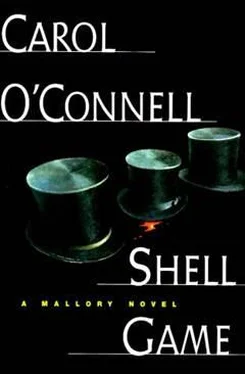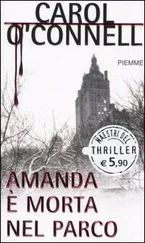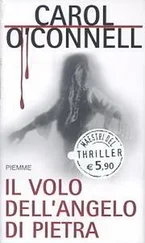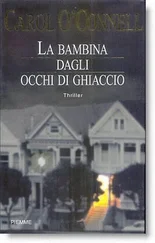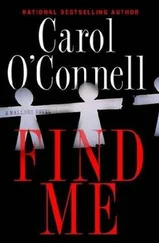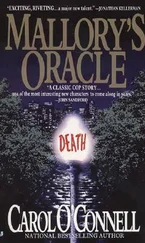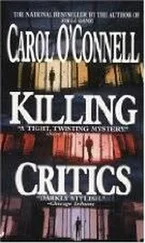„And every time I gave you evidence, you picked it apart. Every time, Riker. You couldn’t just be on my side.“
Now she was the one who was angry. He had blinked once, and their roles had reversed – but how?
She squared off, hands on hips. „What if I had mentioned Oliver’s autopsy? That day on the parade float – wouldn’t you have laughed at me anyway? Then you double-teamed me with Coffey.“
No, wait. This was not going to work on him – not today. She was in the wrong, and this was not going to wind up as his fault.
„Fine,“ he said, undoing his coat buttons. „You want your damn present back? You got it.“
„No, stop.“ She reached out and put her hands over his. „You earned the coat.“ The storm was over. She wore a vague smile as she carefully redid his buttons. And then she brushed the shoulders and inspected him for other debris. She was Kathy when she smiled, ten years old again.
This was not a fair fight.
„The coat is payback,“ she said. „For the day you nailed the dentist.“
„What?“
Mallory turned around and walked back toward the morgue, leaving him in confusion and nursing a small heartache. That was her style, hit and run – unchanged in fifteen years.
The dentist?
He had not thought of that incident in years. How old had she been that day – eleven? He had volunteered to take her to an appointment after school. In the reception room, the dentist had greeted him with a smirk. „So where’s Inspector Markowitz?“ He had pointed to the little girl at Riker’s side. „Did she kill him?“
Young Kathy had not seen the humor in this. She had been moving her foot toward a clean shot at the man’s shinbone, but Riker’s tight grip on her coat collar had restrained her youthful enthusiasm for violence.
In love with his own wit, the dentist had said, „Can we handcuff the little monster to the chair this time?“
After Riker had shoved the dentist against the wall and pinned him there, he further terrified the man by asking if any other little girls had been manacled to his chair. And did the little bastard think that was normal?
There had been one excited, gleeful moment in Kathy’s eyes, when she thought the dentist would lose all his teeth, but Riker had disappointed her and released the man.
Then he had taken the child by the hand and led her outside to a quiet hour of feeding squirrels in Washington Square Park. He had talked about life and warned her that it could be unfair, unkind. What an idiot. As if the former street kid had needed that reminder, she who had dined out of garbage cans on days when she could not steal her dinner. When he asked if the dentist had hurt her with words, the little girl had shaken her head in the silent but emphatic lie, No, of course not, fool.
In that brief moment, he had gotten to know her better; it was something about the lower lip tucked under her front teeth – stoic Kathy. If she had only cried or made some complaint – just once – she would never have this hold over him today.
Now he looked down at his new topcoat. Payback? That was the last time she could remember him being on her side?
Mallory’s hand blocked out the low-riding afternoon sun, as she stared up at the man on the ladder. He was working on an old-style marquee lined with yellow lightbulbs and topped with a row of elegant gold type. The workman bolted down the last letter to spell out ‘Faustine’s Magic Theater.’ Less permanent text appeared in the white areas on three sides of the square overhang. Among the magicians listed for the upcoming performance, Franny Futura was the headliner and the only name she recognized.
The building was twenty-five blocks north of the theater district, but it was Broadway. Not a bad address for the man Charles had described as a tired museum of magic.
Mallory turned to the glass doors trimmed with thin wheels of steel. Riker had removed the yellow crime scene tapes. Was he still here? Still angry? Her birthday gift should have covered a multitude of sins, payback for crimes she had not yet thought of committing. Actually, she had bought the coat because his old one was too threadbare to keep him warm in winter. But this simple explanation would have cost her too much.
She paused by the entrance to inspect a recently installed display case of chrome and glass. Photographs of Oliver’s grandmother were arranged in a circle around her memorial plaque. In a clockwise history of snapshots and publicity photos, Faustine aged from a slight dark-haired girl to a portly diva sporting an obvious wig. In the most recent portrait, hard black lines rimmed her eyes, and the mouth was made wider with dark lipstick. Among the traits that had remained constant throughout Faustine’s long life was a look of hunger, a prominent determined chin and heartless eyes. Mallory wondered if anyone had ever crossed this woman. She thought not.
Pushing through the doors, she stepped into a small lobby. More alterations had been made since the auction. This intimate space was decorated with a dark green couch. The smell of new leather mingled with the odor of fresh plaster. A tarnished brass spittoon sat on the floor beside a standing ashtray. The walls and carpeting were paler shades of green. Faustine had obviously had a penchant for this color – and for attractive young boys.
The old woman’s apprentices were ganged together on a giant theater poster framed in ornate gold. Mallory read the small brass plaque on the wall to her right.
So this photograph had been rescued from 1940, while Faustine was still alive; before the theater seats had been ripped out to accommodate dining tables; before the war had marched into the city in the gray uniforms of occupation forces. It would be two years before Louisa arrived in Paris. Oliver Tree was not listed in this company of boy performers in tuxedos and top hats. Evidently his own grandmother had not considered him a magician. Young Max Candle stood in the background, barely contained inside the borders of the frame. There was a boy’s explosion of energy in his body language. He was set to fly, to escape the camera and rush into real life. In his eyes was an expectation of things to come – wonderful things.
But there was so much more to Malakhai, though he could only have been fifteen that year. He was the dynamic center of the photograph, enthroned in a high-backed chair, a boy king with long hair spread across his broad shoulders. In a sense, Mr. Halpern had been correct – only Malakhai’s hair had grown old. Something of the boy and his beauty had stayed with the man.
The others had followed the more natural course of time, morphing into entirely different faces and forms. The young version of Emile St. John was glorious, with thick curling hair and the body of a god – a remote god, for his eyes were focused on some interior landscape. Franny Futura had been delicate, almost girlish with his full pouting lips and long eyelashes. But Mallory could barely recognize the teenage Nick Prado, sleek and saturnine. Standing a bit apart from the others, he was a dark figure with liquid Spanish eyes and a wicked grin that said, Yes, I am beautiful, aren’t I? There was not enough resemblance to make Prado the father of this graceful boy. All that survived was the love affair with himself.
Mallory turned toward the sound of laughter. She peered through a glass circle in the lobby door. Three of Faustine’s apprentices were on the stage. Emile St. John stood against the backdrop of a green curtain. Nick Prado and Franny Futura sat on wooden crates, passing a wine bottle between them. The auction tables were gone, and so was Oliver’s platform. The movie people must have taken it. Damn you, Riker.
Читать дальше
